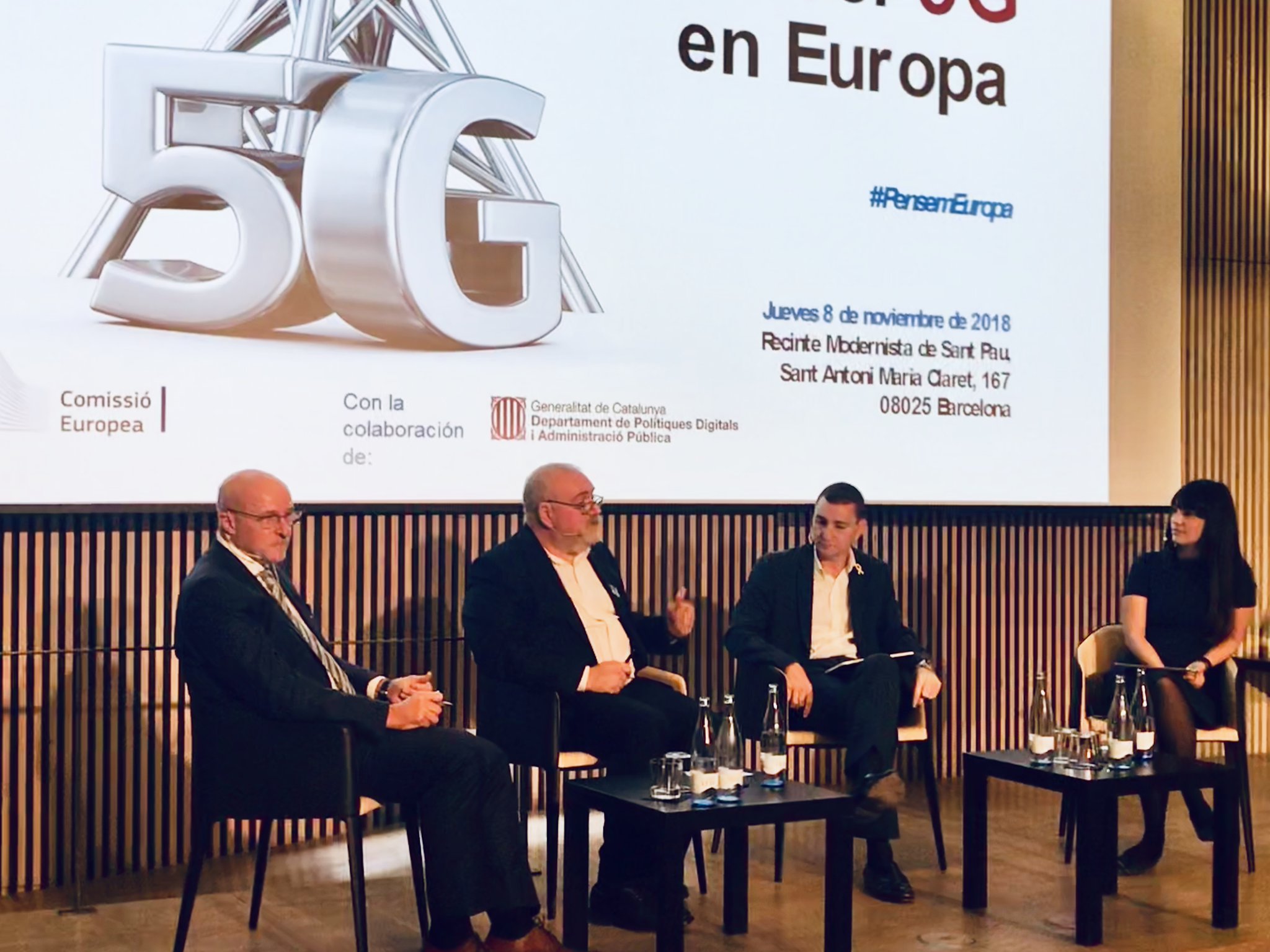"One of the great challenges of technology such as 5G, which we will be implementing, is making it sustainable and humane"
8 of November of 2018
What kind of Europe do we want in the next 60 years? The Representation of the European Commission in Barcelona has held a series of conference-debates to addressed this question, that discussed various high-impact topics: the circular economy, economic and monetary policy, the budget for the next 7 years, and the most recent, held on Thursday 8 at the Recinte Modernista de Sant Pau in Barcelona, concerning the future of 5G in Europe. Mr. Ferran Tarradellas the director of the Commission, initiated the debate on 5G technology and its consequences for the citizens of European Union countries, before handing over to Mr. David Ferrer.
The Generalitat de Catalonia’s secretary of Telecommunications, Cybersecurity and the Digital Society addressed the paradigm shift facing us. According to Ferrer, “this new telecommunications technology presents us with new opportunities, but we are still waiting for it to be deployed and the chance to apply the different standards associated with it. It may well be successfully rolled out next year (2019)”.
Before starting the first roundtable debate, the Director-General of the European Commission’s Directorate-General for Communications Networks, Contents and Technology (DG Connect), Mr. Roberto Viola, outlined the impact of 5G on the general public, using as an example the three major uses of Wi-Fi networks by the public nowadays: transport, sports stadiums and shopping centres. He contrasted the high percentage of accidents which occur due to human error, with the number of accidents which could be prevented through the use of advanced driving technology.
To meet the challenges and opportunities presented by the introduction of 5G throughout Catalonia, the conference began with a roundtable involving companies such as Cellnex, represented by its Global Commercial Director, Mr. Oscar Pallarols; Telefonica’s Managing Director of Thinx-5G Barcelona, Ms Maria Jesús Almazor; and the i2cat research centre’s Director of Technology and Innovation Mr. Sergi Figuerola. Broadly speaking, the debate dealt with the following:
- 5G will be introduced before 5G, since 4G still has remaining potential and it can make use of existing infrastructure.
- It is vital that as a society we become generators of technology, not only consumers. To prevent offshoring.
- Initiatives such as the Digital Innovation Hub and 5G City help promote adoption of the technology.
- Government regulation must facilitate its implementation and deployment, while the various operators must share the market.
- Challenges: Smart cities must be be able to exchange information in real time and continue leading the broadband networks in Europe as they have up to now.
After a short stop for coffee, it was time to find out about 5G applications in our industry and the market opportunities it will bring with it. The director of the Fundació TIC Salut Social, Mr. Josuè Sallent, participated in this second roundtable, joined by the director of the Mobile World Capital Barcelona, Mr. Carlos Grau and the director of smartCatalonia, Mr. Daniel Marco.
“Immersive technology, brings disruptive change”, Sallent began. “A change coinciding with a time at which we are suffering from a lack of health professionals in certain areas. How this technology can help bring healthcare closer to the individual, is key”. The examples given by the director of TIC Salut Social included the impact of 5G on the use of telemedicine, remote surgery in areas with difficult access and the training of professionals using exponential technologies such as virtual and augmented reality. Nevertheless, Sallent continued, “we need to change the way people perceive technology. We need to humanize it. The screen between the doctor and the patient shouldn’t generate rejection, otherwise we won’t be prepared to talk to the doctor via a screen when they’re over a 100km away”. Finally, Sallent outlined the three major challenges which, in his point of view, “we will soon face. We will approach them holistically, with cross-sectional profiles”:
- Building infrastructure which makes the implementation of this technology possible
- Retraining of professionals to prepare themselves for any changes.
- Humanizing technology to make it more approachable.
Finally, both Marco and Grau mentioned the fact that the implementation of 5G will help attract investment and will create its own ecosystem. The director of MWC Barcelona welcomed the advantages of 5G over its predecessor: lower energy consumption, ultra-definition and lower response times. Lower latency.
The debate concluded with a reference to the Internet of Things (IoT). We are closer than ever to seeing more and more consumer electronics making use of the IoT, with sensors, cameras and microprocessors that improve usability and the user experience, in transport (cars and public services), cities (lighting) and houses (refrigerators, washing machines…)
-
The director of the Fundació TIC Salut Social, Josué Sallent, speaking during The Future of 5G conference-debate, organized by the EC.


